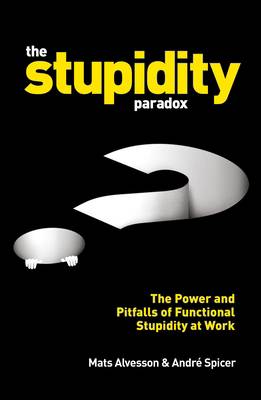
- Retrait gratuit dans votre magasin Club
- 7.000.000 titres dans notre catalogue
- Payer en toute sécurité
- Toujours un magasin près de chez vous
- Retrait gratuit dans votre magasin Club
- 7.000.0000 titres dans notre catalogue
- Payer en toute sécurité
- Toujours un magasin près de chez vous
The Stupidity Paradox
The Power and Pitfalls of Functional Stupidity at Work
Mats Alvesson, André SpicerDescription
unctional stupidity can be catastrophic. It can cause organisational collapse, financial meltdown and technical disaster. And there are countless, more everyday examples of organisations accepting the dubious, the absurd and the downright idiotic, from unsustainable management fads to the cult of leadership or an over-reliance on brand and image. And yet a dose of stupidity can be useful and produce good, short-term results: it can nurture harmony, encourage people to get on with the job and drive success. This is the stupidity paradox.
The Stupidity Paradox tackles head-on the pros and cons of functional stupidity. You'll discover what makes a workplace mindless, why being stupid might be a good thing in the short term but a disaster in the longer term, and how to make your workplace a little less stupid by challenging thoughtless conformity. It shows how harmony and action in the workplace can be balanced with a culture of questioning and challenge.
The book is a wake-up call for smart organisations and smarter people. It encourages us to use our intelligence fully for the sake of personal satisfaction, organisational success and the flourishing of society as a whole.
Spécifications
Parties prenantes
- Auteur(s) :
- Editeur:
Contenu
- Nombre de pages :
- 288
- Langue:
- Anglais
Caractéristiques
- EAN:
- 9781781255414
- Date de parution :
- 04-04-17
- Format:
- Livre broché
- Format numérique:
- Trade paperback (VS)
- Dimensions :
- 130 mm x 196 mm
- Poids :
- 317 g

Les avis
Nous publions uniquement les avis qui respectent les conditions requises. Consultez nos conditions pour les avis.






